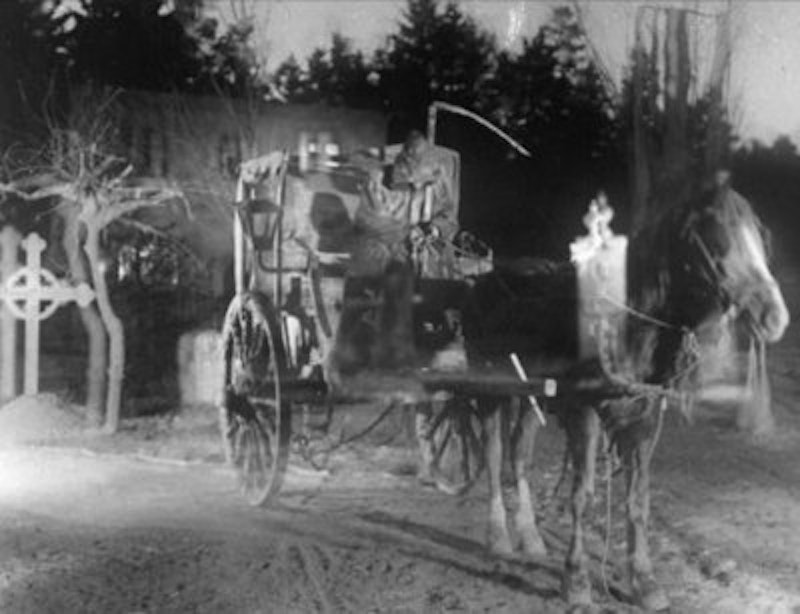“It completely overwhelmed me. I was shaken to the core.” These are the words Ingmar Bergman used to describe Victor Sjöström’s 1921 film, The Phantom Carriage. It’s not surprising that Bergman had such a reaction to the film. This silent masterpiece is intensely felt rather than thought and it’s due mostly to the emotional (but never melodramatic) performances as well as stunning visuals and special effects.
The film tells a story of David Holm (played by Sjöström himself), an alcoholic who’s squandered his life and neglected his wife and two children. As the film opens, it’s New Year’s Eve, and a Salvation Army sister, Edit, is on her deathbed. She has one last wish and that is to speak to David in a last effort to save his soul.
Edit’s friend finds David, who’s sitting at a cemetery with two other men, drunk as usual, and refusing to see Edit. He tells others about a legend—how a person who dies at midnight on New Year’s Eve must drive Death’s carriage and collect the souls for an entire year. The story’s amusing to David until one of the drunkards strikes David on the head with a bottle just before midnight.
At this moment, David’s soul is separated from his body and the previous carriage driver decides to remind David of his past. The film’s told in a series of flashbacks—we see David living happily with his wife and two children. David’s brother often joins the family for picnics, and there’s an atmosphere of peace and happiness.
Misery and terror struck when David began to drink. Once he started, he was unable to stop, and this brought down the entire family, including his brother, who was jailed for killing a man. David also serves a prison sentence and once he gets out, realizes that his wife and children have run away. Filled with fury, David decides to find his wife and release his wrath.
He meets Sister Edit throughout his search for his wife when he enters the Salvation Army Mission. Edit gives him a bed to sleep in as well as food. She’s a good and kind woman truly concerned with the wellbeing of others, especially their spiritual life. Edit even mends David’s coat, which he laughingly rejects in the morning.
David’s still rejecting the fact that he must become the driver of Death’s carriage, and we witness another flashback—the time when Edit tried to bring together David and his family. All she wanted was for David to turn back to God so that he may live in peace with his family. But this reconciliation proves empty because David returns back to drinking and abuse.
At some point, his wife has had enough (yet again!) and decides to get the children out of their beds and leave. She locks David in another room, but upon realizing this, David grabs an axe and begins to break through the door. (Naturally, one thinks of the famous scene in Stanley Kubrick’s 1980 The Shining in which drunk Jack Torrance goes after his wife and child.)
As we leave this flashback and go to the present time, we witness once again Edit dying. She doesn’t want to die until she speaks to David because she feels responsible for his downfall. When David hears this, he finally breaks his drunken cynicism and begins to cry.
Georges, the current driver of Death’s carriage, decides to show David that his wife is planning to poison herself and their children. David’s beside himself and runs to the shack in which they now live. They’re destitute and desperate. In this final moment, David breaks down. He’s asking for forgiveness and another chance, that as the new year approaches, he will once again, become a good man. He speaks to God and says: “Lord, please let my soul come to maturity before it is reaped.”
Sjöström’s film evades categorization. It’s a ghost story but the focus on morality and spiritual life elevates the film to philosophical and theological heights. The film’s morality creates a cautionary tale about alcoholism and the importance of sobriety for a good life. But once again, Sjöström doesn’t simplify David’s story. At the center of it is salvation, not merely of David but of other characters as well.
The Phantom Carriage can’t be seen without accepting the existence and compassion of merciful God. Here, our own existence is all-encompassing only when we admit that our lives are to be lived in relation to God. Sjöström’s vision is mystical. It’s about bringing David down to his knees, crying the tears of God, submitting himself and recognizing the essential quality of humility. To become a new human being in the new year is deeper than any temporal celebration. It’s about the salvation of one’s soul which transcends time and space.

